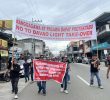DAVAO CITY – This city lags behind in awareness to prevent the spread of the human immunodeficiency virus (HIV), which causes the dreaded acquired immune deficiency syndrome (AIDS), as the number of HIV-AIDS cases rose in the first quarter of this year.
The Department of Health said there are 69 new cases of HIV and 20 cases of AIDS from January to March this year, bringing the total count of persons with HIV/AIDS to 937 since 1984.
Only one female is among the new infected persons.
The DOH ranked Davao Region the fifth highest growth of HIV cases in the country at nine percent. The count of HIV cases in Davao last September 2013 was 713.
The City Health Office’s Reproductive Health & Wellness Center (RHWC) reported an average of 15 to 20 new cases a month from its HIV tests.
But Dr. Jordana Ramiterre, head of RHWC the said the statistics is “very low” as she believed more cases in the city remained unreported.
“The stigma on HIV is still high in this city, that is why there is a hindrance for people to approach hospitals and clinics to get tests and avail of other services,” said Ramiterre.
Ramiterre noted that sexual lifestyle among the youth in the urban area is a cause of concern, as the 25-34 years old age group posted higher cases at 478 since 1984, followed by the 15-24 age group with 397.
Jeff Fuentes of the City Health Population Control Office, said the statistics only shows that most cases are reported on people engaged in homosexual contact, but this does not show the whole picture of HIV cases in the region.
“Our campaign has been focused on MSM (men having sex with men). But if we could have an equal number of tests like among ten men, ten women and ten LGBT (lesbians, gays, bisexuals, transvestites), then we could be able to see the true situation of HIV in the city,” he said.
Fuentes said there are many myths pervading among people about AIDS and sex that has contributed to the rise of cases.
“That is why HIV is not just a medical issue. It is a social issue. Why are people afraid to take tests? There are myths, there are people who don’t want to talk about it in the open,” he said.
Fuentes said education is still key to make people to break ignorance on HIV.
Ramiterre expressed reservations on the DOH proposal for mandatory testing on HIV, saying this may have detrimental effects.
“What’s the guarantee that people would like to know the results, or would they keep coming back to take tests regularly?” asked Ramiterre.
Besides, mandatory testing runs counter to the Philippine AIDS Prevention and Control Act of 1998 or Republic Act 8504 which requires voluntary testing, she said.
One of Ramiterre’s staff told Davao Today that one university sought the office’s assistance to conduct mandatory HIV testing of its students. The staff said however, that this move may be used by the school to take actions on students who may be found positive with HIV.
Ramiterre said they are doubling their efforts on education in schools and barangays, tapping peer educators among people with HIV and non-government organizations, to help raise awareness on taking responsibility on one’s health and lifestyle.
She added that they had targeted 15 barangays for their education drive that aims to have officials come up with a resolution to promote HIV awareness and testing among their constituents. (davaotoday.com)








